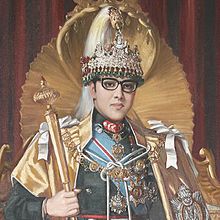Birendra
Birendra Bir Bikram Shah Dev (विरेन्द्र वीर विक्रम शाह देव) (born December 28, 1945 in Kathmandu ; † June 1, 2001 there ) was King of Nepal from 1972 until his death .
Life
Birendra enjoyed a good education in Europe , Asia and America , including from 1959 to 1964 in Eton , at the University of Tokyo (1967) and at Harvard University (1967–1968). In 1970 Birendra was married to Aishwarya Rajya Lakshmi from the Rana family to end the decades-long dispute over supremacy in Nepal. When he ascended the throne in 1972, he was already a well-traveled man. Birendra was more open to parliamentary democracy than his father and predecessor Mahendra. For the time being, however, he stuck to the Panchayat system by banning political parties. After violent unrest, he signed a new constitution in November 1990 that made him a constitutional monarch. However, it did not succeed in solving the country's social problems. Maoist rebels have been fighting the government since 1996 .
In 2001, Birendra and much of his family were killed in a mass murder . The deed is said to have been committed by his son, heir to the throne Dipendra . However, this version of the sequence of events is doubted by many citizens in Nepal. Dipendra was proclaimed king after Birendra's death. However, since he was in a coma from the gunshot wounds he allegedly inflicted on himself in the course of the incidents in the royal palace, Birendra's brother, Prince Gyanendra , was declared regent. Gyanendra officially succeeded as King of Nepal after Dipendra died three days later.
Web links
- King Birendra: From sole ruler to representative. In: Spiegel Online . June 2, 2001.
- Birendra: Nepal's monarch of change. In: BBC.co.uk . June 2, 2001(English).
- Birendra Bir Bikram Shah Deva. In: rulers.org. (English).
| predecessor | Office | successor |
|---|---|---|
| Mahendra Bir Bikram Shah Dev |
King of Nepal 1972-2001 |
Dipendra Bir Bikram Shah Dev |
| personal data | |
|---|---|
| SURNAME | Birendra |
| ALTERNATIVE NAMES | Birendra Bir Bikram Shah Dev |
| BRIEF DESCRIPTION | Nepalese king |
| DATE OF BIRTH | December 28, 1945 |
| PLACE OF BIRTH | Kathmandu |
| DATE OF DEATH | June 1, 2001 |
| PLACE OF DEATH | Kathmandu |

